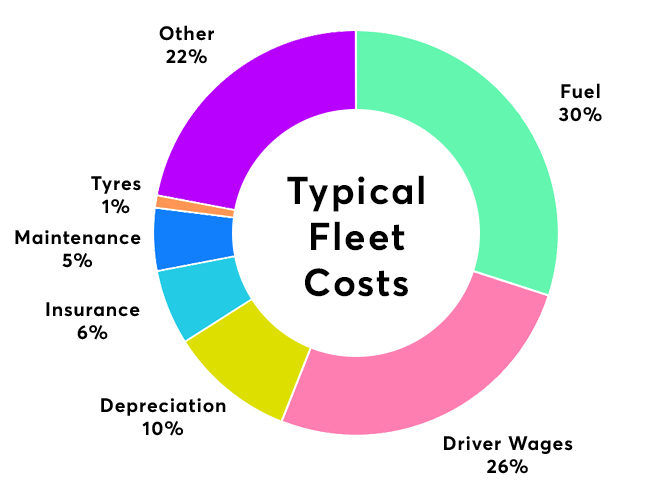
The management of fleet vehicles is crucial for any transportation or distribution company that relies on its assets to generate revenue, and an effective GPS tracking tool could be the solution.
With a GPS tracking system in place, businesses can focus on enhancing and streamlining their fleet management processes. Whilst also identifying cost-saving and efficiency opportunities too.
What Is GPS Tracking?
GPS (Global Positioning System) technology is a common tool that is used throughout today’s world. For instance, GPS tags can be found in modern smartphones, satellite navigation systems, and in the microchips of household pets.
GPS tracking works by locking onto a number of satellites orbiting the earth to triangulate the position of a GPS tag. Combined with mapping and cellular communication, a GPS device can provide an exact and real-time location of the physical item that is being tracked. This makes GPS technology an ideal solution for tracking the location of vehicle fleets.
What Is a GPS Fleet Tracking Tool?
![]()
GPS is a leading technology in fleet telematics, helping businesses to obtain essential data regarding individual vehicles or large fleet operations. Modern GPS tracking tools work through cloud-based platforms in conjunction with GPS trackers, which are affixed to a business’s fixed assets. In this case, vehicles. The ability to cars, HGVs, and Vans in real-time is achieved by using a specified handheld GPS device or via a cloud-based app. A cloud-based app, which is common with most top-quality asset tracking systems, would allow users to see real-time locations across desktops, tablets, and mobiles.
By implementing a GPS fleet tracking system, fleet managers are able to get a detailed view of all company vehicles in real-time. This data can then offers a wide range of benefits for fleet management companies, including:
- Locating a fleet in real-time, both globally and locally
- Extensive routing and mapping capabilities
- Gathering analytics to help identify idling, speeding, and unauthorised use
- Analyzing data regarding maintenance and repair schedules
- The ability to log and create accident reports
- Detailed notification alerts for employees and customers
The Benefits of Using a GPS Fleet Management System
Improve Cost Efficiency
By monitoring vehicles with GPS tools, fleet managers are able to achieve a higher level of visibility regarding their operations. They can know where each vehicle is located and can utilise data to make decisions and improve efficiency.
For example, a courier company can use a GPS tracking system to identify which vehicle is closest to a pick-up location. By sending the nearest vehicle to collect that parcel, they can ensure that it can be collected quickly whilst also keeping fleet fuel costs to a minimum.

Tracking fleet vehicles can also allow businesses to see how much they’re spending as a cost per mile. As well as how much they’re making in terms of revenue per mile. Businesses can then benefit from collecting data such as distances travelled, arrival times, and stationary hours.
Fleet managers can also use this data to reduce vehicle maintenance costs. From vehicle analytics, they can identify problems and plan a preventive maintenance and servicing schedule.
Higher Driving Standards
As well as increasing business revenue and profitability, using GPS to track fleets can also improve the safety and compliance of drivers.
Through driver data, fleet managers can see which drivers are safe on the road and which ones are not.
In turn, they can incentivize drivers to improve their standards of driving and reduce the risk of accidents. They can even provide additional driver safety training to those employees that need it.
Reduce Vehicle Theft
Vehicles are essential and valuable assets to any business. Whether they’re leased or owned, they need to be managed and protected to ensure that everyday processes can be conducted.
Through fleet tracking, businesses can recover lost or stolen vehicles with the real-time location data displayed by a GPS system.
This information can also be provided to the police for fast recovery.
Increase Customer Satisfaction
A key benefit of GPS tracking tools for businesses offering a face-to-face customer experience is the effect it has on improving customer satisfaction levels.
For instance, a courier company that uses GPS data can provide its customers with real-time delivery updates and shipping notifications.
Not only does this let customers know where their parcel is in transit, but it can also notify them when their parcel has been dispatched or delivered.
Conclusion
Implementing a GPS tracking model is ideal for any business that has high-value vehicles to manage. Its main purpose is to enhance fleet efficiency and provide valuable insights into vehicle and driver performance.
With the right software in place, a business can reduce fuel consumption, maintenance costs, the number of accidents, and paperwork. Not to mention the increased recovery time and reduction of lost or stolen fleet assets.
Finally, and most vitally, a fleet tracking system can essentially boost business revenue and profitability, and improve customer service.




There are 3 comments
Nullam luctus arcu at mi gravida, quis ornare metus venenatis. Phasellus sed arcu sed eros sagittis luctus eget in justo. Aliquam porta turpis magna, at porta purus egestas quis.
Morbi id purus eget metus fermentum consequat eu in diam. Phasellus at vestibulum dolor. Quisque maximus felis eu sapien commodo, ut molestie libero facilisis.
Nullam luctus arcu at mi gravida, quis ornare metus venenatis. Phasellus sed arcu sed eros sagittis luctus eget in justo. Aliquam porta turpis magna, at porta purus egestas quis 2.